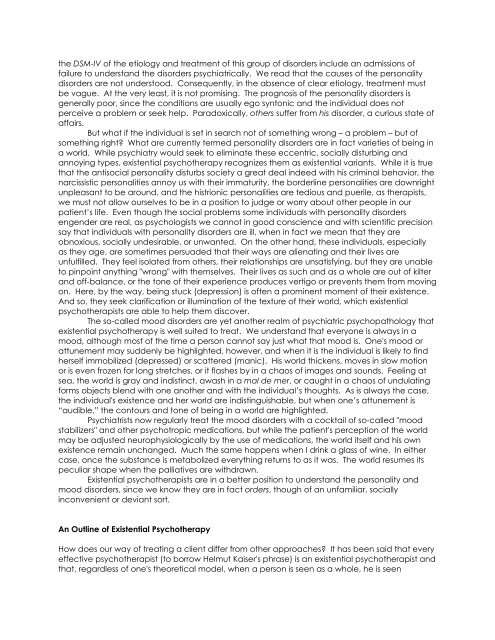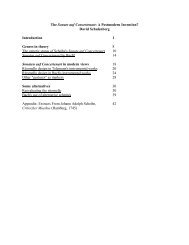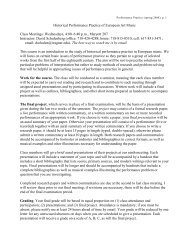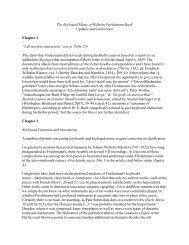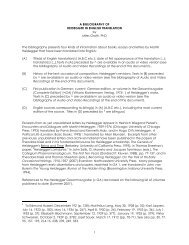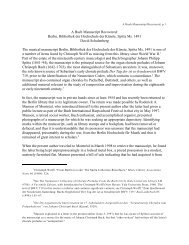SEVEN PAPERS ON EXISTENTIAL ANALYSIS ... - Wagner College
SEVEN PAPERS ON EXISTENTIAL ANALYSIS ... - Wagner College
SEVEN PAPERS ON EXISTENTIAL ANALYSIS ... - Wagner College
Create successful ePaper yourself
Turn your PDF publications into a flip-book with our unique Google optimized e-Paper software.
the DSM-IV of the etiology and treatment of this group of disorders include an admissions of<br />
failure to understand the disorders psychiatrically. We read that the causes of the personality<br />
disorders are not understood. Consequently, in the absence of clear etiology, treatment must<br />
be vague. At the very least, it is not promising. The prognosis of the personality disorders is<br />
generally poor, since the conditions are usually ego syntonic and the individual does not<br />
perceive a problem or seek help. Paradoxically, others suffer from his disorder, a curious state of<br />
affairs.<br />
But what if the individual is set in search not of something wrong – a problem – but of<br />
something right? What are currently termed personality disorders are in fact varieties of being in<br />
a world. While psychiatry would seek to eliminate these eccentric, socially disturbing and<br />
annoying types, existential psychotherapy recognizes them as existential variants. While it is true<br />
that the antisocial personality disturbs society a great deal indeed with his criminal behavior, the<br />
narcissistic personalities annoy us with their immaturity, the borderline personalities are downright<br />
unpleasant to be around, and the histrionic personalities are tedious and puerile, as therapists,<br />
we must not allow ourselves to be in a position to judge or worry about other people in our<br />
patient’s life. Even though the social problems some individuals with personality disorders<br />
engender are real, as psychologists we cannot in good conscience and with scientific precision<br />
say that individuals with personality disorders are ill, when in fact we mean that they are<br />
obnoxious, socially undesirable, or unwanted. On the other hand, these individuals, especially<br />
as they age, are sometimes persuaded that their ways are alienating and their lives are<br />
unfulfilled. They feel isolated from others, their relationships are unsatisfying, but they are unable<br />
to pinpoint anything "wrong" with themselves. Their lives as such and as a whole are out of kilter<br />
and off-balance, or the tone of their experience produces vertigo or prevents them from moving<br />
on. Here, by the way, being stuck (depression) is often a prominent moment of their existence.<br />
And so, they seek clarification or illumination of the texture of their world, which existential<br />
psychotherapists are able to help them discover.<br />
The so-called mood disorders are yet another realm of psychiatric psychopathology that<br />
existential psychotherapy is well suited to treat. We understand that everyone is always in a<br />
mood, although most of the time a person cannot say just what that mood is. One's mood or<br />
attunement may suddenly be highlighted, however, and when it is the individual is likely to find<br />
herself immobilized (depressed) or scattered (manic). His world thickens, moves in slow motion<br />
or is even frozen for long stretches, or it flashes by in a chaos of images and sounds. Feeling at<br />
sea, the world is gray and indistinct, awash in a mal de mer, or caught in a chaos of undulating<br />
forms objects blend with one another and with the individual’s thoughts. As is always the case,<br />
the individual's existence and her world are indistinguishable, but when one’s attunement is<br />
“audible,” the contours and tone of being in a world are highlighted.<br />
Psychiatrists now regularly treat the mood disorders with a cocktail of so-called "mood<br />
stabilizers" and other psychotropic medications, but while the patient's perception of the world<br />
may be adjusted neurophysiologically by the use of medications, the world itself and his own<br />
existence remain unchanged. Much the same happens when I drink a glass of wine. In either<br />
case, once the substance is metabolized everything returns to as it was. The world resumes its<br />
peculiar shape when the palliatives are withdrawn.<br />
Existential psychotherapists are in a better position to understand the personality and<br />
mood disorders, since we know they are in fact orders, though of an unfamiliar, socially<br />
inconvenient or deviant sort.<br />
An Outline of Existential Psychotherapy<br />
How does our way of treating a client differ from other approaches? It has been said that every<br />
effective psychotherapist (to borrow Helmut Kaiser's phrase) is an existential psychotherapist and<br />
that, regardless of one's theoretical model, when a person is seen as a whole, he is seen


